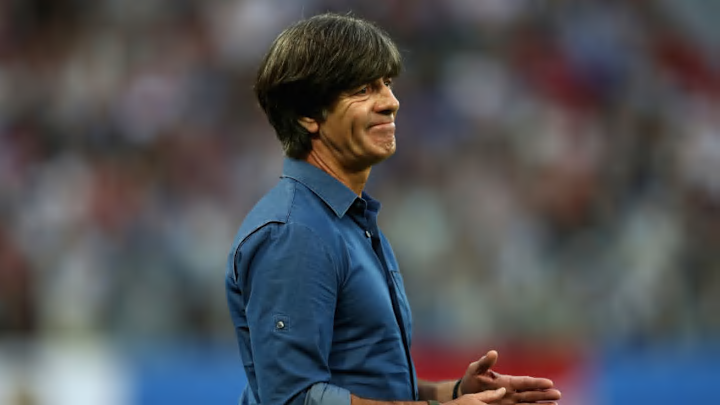Germany manager Joachim Low is reportedly Arsenal’s first choice to replace Arsene Wenger, but how would he fare in the club game?
As Arsene Wenger’s increasingly painful [what is the opposite of a victory lap?] limps to its conclusion, speculation about his replacement continues to swirl. Given the only remaining requirements to be considered a viable Wenger replacement are (1) being a professional manager and (2) not being Wenger, the quality of this speculation has varied wildly. The news Germany manager Joachim Low is the club’s preferred choice, however, qualifies as interesting. Fascinating, even.
Low is routinely linked with these sorts of openings alongside the usual participants in the game of musical chairs the world of elite management has become over the past decade, but Low isn’t like these other managers. Low is an international manager. A high-profile international manager, a successful international manager, a well-liked international manager, but an international manager all the same. As a result, it’s hard to know what to make of him, or at least how to compare him to the elite club managers with which he is presumably competing (if indeed he is competing at all) for the Arsenal job.
This, it must be said, is a strange thing. It’s the same job, after all, isn’t it? Of course there are differences between the club game and the international game, the most significant of which is the time managers and players get to spend together (not much vs. a lot), but the basic concepts translate: Adopt a playing style that maximizes the strengths of your players and minimizes their weaknesses, and motivate them to execute your instructions. That’s easier said than done, but it shouldn’t be any easier said than done in one setting than the other.
And indeed there are plenty of coaches who have won major trophies at both the club and international levels, but the key point is almost all of them did the former before they did the latter. Taken together, the winning managers of the past six World Cups won 25 major club trophies before their international careers and five after (at least, that is, if we exclude Marcello Lippi’s trophy-laden spell with Guangzhou Evergrande from 2012-14, which we will).
This is partly a reflection of the shifting significance of the club and international games. The World Cup will always hold a special charm, despite FIFA’s best efforts, but the Champions League has far surpassed it in terms of the quality of play. The best managers now work for clubs, and for the most part will consider international management only when their club careers have run their course and they’re looking for a more relaxing final act.
This state of affairs has recently been emphasized by Antonio Conte’s brief, successful stint with Italy, during which he led what was widely considered a weak Azzurri squad to a respectable quarterfinal defeat to Low’s Germany at Euro 2016 before leaving because he was bored (the implication being a good club manager could take even a bad squad a long way on the international stage), and Roberto Martinez’s appointment as Belgium manager after the same tournament.
If the best Belgium — who boast one of the best squads in the world, and the majority of whose star players are playing the best soccer of their careers — if the best they could do was a man who had most recently been fired for leading Everton to a second consecutive bottom-half Premier League finish, well, what did that say about the overall desirability of the international game to the world’s best managers?
Next: Ranking every Premier League season
Despite this, and the fact he hasn’t managed a club team in nearly 15 years, and before that the peak of his managerial career was leading Stuttgart to the DFB-Pokal in 1997 (they won the final 2-0 against Energy Cottbus), Low’s name seems to find its way into the conversation every time a decent club job becomes available.
Perhaps this is merely a reflection of these clubs’ lack of imagination. Or perhaps we’ve all been spinning on the managerial merry-go-round for such a long time we’ve become too dizzy to consider the possibility more than, like, eight people might be qualified for these types of jobs. Or perhaps Low’s actually, you know, a good manager.
The remarkable thing, after all these years of his very publicly being a good manager, is there’s only one way to find.
